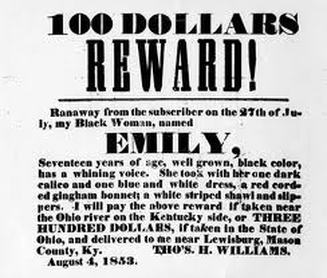Fugitive Slave Act
-Before the fugitive slave act, slaves were able to run away to free states and gain their freedom. This act took away all hope for the slaves.
-The Fugitive Slave Act was passed by the United States Congress on September 18, 1850, as part of the Compromise of 1850 between Southern slave holding interests and Northern Free-Soilers.
- This was one of the most controversial acts of the 1850 Compromise and heightened Northern fears of a slave power conspiracy
- This law stated that all run away slaves must be returned to their owners in their slave states
- This gave slaves one less way to escape from their awful lives and forced them to lose even more hope in ever becoming free
- The Pastor of the Wesleyan Methodist Church of Syracuse, New York wrote in 1855:
" I never would obey it. I had assisted thirty slaves to escape to Canada during the last month. If the authorities wanted anything of me, my residence was at 39 Onondaga Street. I would admit that and they could take me and lock me up in the Penitentiary on the hill; but if they did such a foolish thing as that I had friends enough on Onondaga County to level it to the ground before the next morning. The slaves could no longer take control over what they could never imagine."
-The Fugitive Slave Act was passed by the United States Congress on September 18, 1850, as part of the Compromise of 1850 between Southern slave holding interests and Northern Free-Soilers.
- This was one of the most controversial acts of the 1850 Compromise and heightened Northern fears of a slave power conspiracy
- This law stated that all run away slaves must be returned to their owners in their slave states
- This gave slaves one less way to escape from their awful lives and forced them to lose even more hope in ever becoming free
- The Pastor of the Wesleyan Methodist Church of Syracuse, New York wrote in 1855:
" I never would obey it. I had assisted thirty slaves to escape to Canada during the last month. If the authorities wanted anything of me, my residence was at 39 Onondaga Street. I would admit that and they could take me and lock me up in the Penitentiary on the hill; but if they did such a foolish thing as that I had friends enough on Onondaga County to level it to the ground before the next morning. The slaves could no longer take control over what they could never imagine."
Reaction
North
-voluntary anti-slavery associations that aimed to protect black fugitives from legal kidnappings, like hiding fugitives and paying for their passage to Canada
-writing/distributing petitions and warning the public of the arrival of slave catchersdd
-assistance in the form of clothing, fuel and furniture donations, small loans, and medical attention
-writing/distributing petitions and warning the public of the arrival of slave catchersdd
-assistance in the form of clothing, fuel and furniture donations, small loans, and medical attention
South
-"clamored . . . for a stronger fugitive slave law," writes James M. McPherson (1988, p. 79), "less for practical advantage than as a matter of principle.... [N]orthern aid to escaping slaves was an insult to southern honor."
